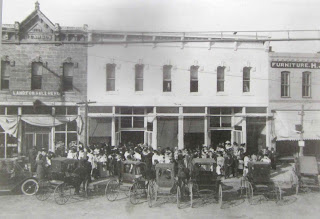From the Valley Falls New Era, June 6, 1896
The steamer Delaware is proving a bonanza to young people
who want to go picnicing and have a pleasant ride up the majestic Delaware.
Captain Lungstrum knows how to take care of a merry party of young people, and
steamboat excursions are getting to be the thing. Beautiful grounds have been
laid out up the river, nice shade trees, places for swings and hammocks and
croquet grounds, and it will pay you to take a day’s outing and enjoy a trip on
the steamer.
Last Friday a merry party of young people from Winchester
and vicinity enjoyed themselves up the river, and were well pleased with their
trip on the steamer. The party was a jolly one and consisted of Ella Logan, Dr.
Maggie McCrea, Cloud McCrea, Ethel French, Will French, Eva Houston, John
McCrea, Irene Adams, Aggie Curry, Mary Weir, May Steuart, Anna Dill, Myrtle
French, Weir Steuart, Ira Stewart, Lorena Houston, Mr. and Mrs. O.H. Curry,
Laura Weir, Will Weir, Alice Thrusby, Cloud French, Lizzie Dill, Annie Cole,
Renwick Steuart, Beckie Logan, James Logan, Anna McKemey, Maggie McKemey, Will
McCrea, Lulu Dill, Lizzie Mitchell, Will Mitchell, Bruce French, John French,
John Dill, Harvy Curry, Will Cathcart.
Saturday Night
Saturday night the steamer had a happy crowd of our young
people for passengers to the picnic grounds. Captain Lungstrum proved himself
equal to the occasion, and made the trip a delightful one to the following
young people of this city: The Misses Frances and Maud Johnson, Allie Gardiner,
Metta and Grace Legler, Gertie Goodrich, Jessie Townsend, Maggie Tischhauser,
Lestia Aitken, Louisa Schuhmacher, Fannie Marsh, Minnie Clark, Erma Spencer,
Adda Falls, Henrietta Hughan, Nellie Murray, Flora Lewis, Maud Diehl, Adah
Myers, Pearl Hubbard, Hortense Harman.
 |
| from the Meriden Tribune, May 6, 1893 |
The Messrs. A.B. Schaeffer, L.E. Dort, Wallace Aitken, Harry
Goodrich, Charles Kemper, Walter Kauffman, Guy Dort, Louis Schuhmacher, John
Murray, Sam Dornblaser, Camil Flacey, Ed. Burkert, Roscoe Booth, Curtis
Gephart, Leigh Myers, Everett Mitchell, Albert Myers, Russell Hubbard and Hale
Bliss.
This story appeared in “Yesteryears” in April 1988.










